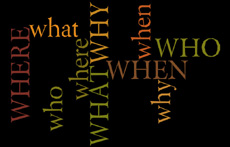|
Before you start work on your personal history, you can make more efficient use of interview time by making notes before the interview. Whether you are being interviewed, or you are interviewing relatives, think about the answers to these basic questions. Assume that "you" is you (if you are writing on your own) or your subject (if you are interviewing someone else).
- What is the purpose of this project? What do you hope to accomplish?
- What is the purpose of this interview? Who will hear or see it? Who will have access to the unedited interview?
- Who is your intended audience? Family? Friends? Historians? Researchers? The public? Will the stories based on the interview be published, made available to a select few, or kept private? Does the narrator want the material (or parts of it) kept confidential?
- Above all, what story do you want to tell. Do you plan to cover the whole life or to emphasize parts of it (such as the war years)?
- What is the overall story about your family's journey - challenges, endurance, and triumphs. What parts of that story are most important? What parts don't most people know about? What parts do you prefer to ignore?
- If you have trouble getting going, or think you don't have much to say, it often helps to start by talking about old family photographs (of relatives from earlier generations and of you and your immediate family at various life stages). Photos can magically elicit memories (including memories of stories you've heard all your life). Get old photos out and sort them roughly into chronological order, so you can go through them, identifying who the people were and what was happening in the photos. (Record the answers; you'll be glad later you did!) In captions, you want to convey briefly the story behind each photo - for example: "Uncle Vern was courting Aunt Pauline when this photo was taken."
- What do you remember about your parents and grandparents? How did they meet? List their children and grandchildren. Do you know where they lived, their education, careers, military service, beliefs, talents and abilities, illnesses, and major life events? Create a timeline of family events; you may be surprised at what a complete timeline will reveal about family history and dynamics.
- Which family members' lives do you want to talk about? Why are they important? What were the major events in their lives? Do you have documents or clippings about them or know where they can be found?
- Create a timeline of significant events in your life. Include the basics (birth, childhood, education, training, career highlights, love, marriage, children, and special interests). More important, highlight the turning points and special events that helped shape your life. What were your proudest moments, your toughest challenges, your greatest frustrations, your fondest memories? How were you affected by where you lived at various stages of your life - and by whether you stayed in one place or moved. Jot down brief notes about stories that convey those life highlights - stories to tell during interviews.
- Which world events and social and cultural changes affected your life (and how) and which people (famous or otherwise) influenced your life choices. How did involvement in politics, military life, or religion affect your life? How have your feelings, beliefs, and values changed over the years? What are the main messages (including lessons learned) that you want to leave the next generation?
|

